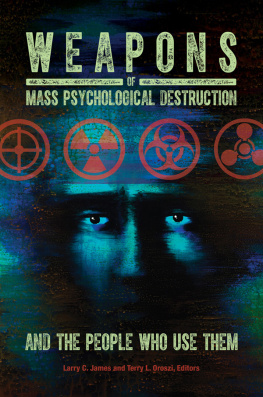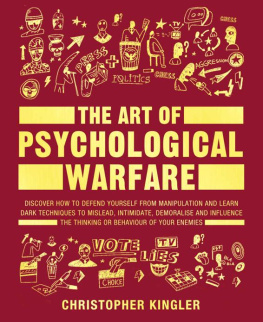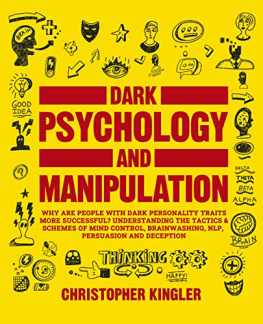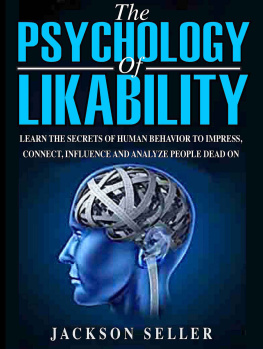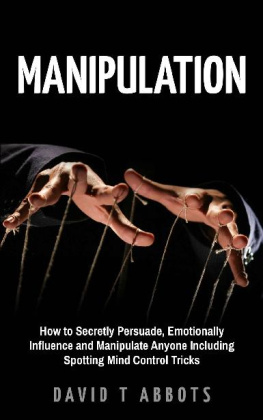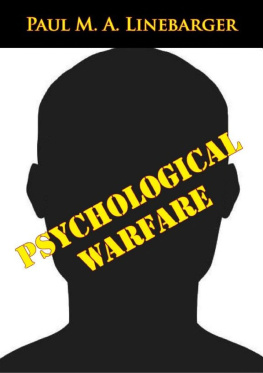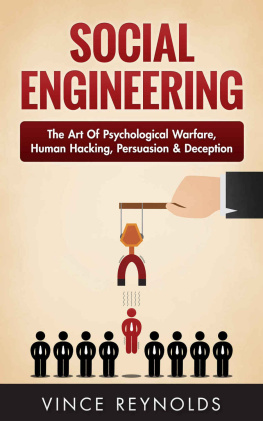The Art of Psychological Warfare
How to Skillfully Influence People Undetected and How to Mentally Subdue Your Enemies in Stealth Mode
By Michael T. Stevens
Copyright 2016 by Make Profits Easy LLC
profitsdaily123@aol.com
Table of Contents
Introduction
How would you like to have the ultimate power of control over other people? It sounds good, doesn't it? Well, we'll tell you up front, this book will share with you the secrets of powerful people from every walk of life. From politicians to CEOs to religious leaders to celebrities, all of these people use the methods and techniques we will lay out here. Not only will these prove to be extremely powerful, but they are secrets anyone can master. Let us assure you: There is no one who is not capable of mastering these techniques.
So why is it not more common? Well, they actually are somewhat common, but not everybody knows all of them or how to make use of them. Even low-level salesmen or the hustler at the corner market is savvy enough to use some variety of psychological tactics. For the rest, many people are afraid of having this much power. They're afraid that using these techniques makes you a sociopath, a schemer, or a hypocrite.
We'll say right up front: You can abuse psychological warfare to your own profit and advantage. We leave it up to you to make your moral decisions of whether to use these tactics for good or ill. Just because you learn how to steal cars doesn't mean you should go around stealing cars; you can use that knowledge to prevent car theft as well. In "hacker" circles, this book would be considered a manual on "social engineering," because basically this is a manual for hacking other people's brains. But you have to remember that hackers work for the police and the government too. And as we'll find out, police and governments use social engineering too!
As you read through this book, keep in mind that the following traits will be beneficial to you when you try to put this book into practice:
- Confidence - In today's society, this is almost a taboo word by itself. For those of you who don't feel confident, just fake it. We will dwell on confidence many times in this work. For now, we'll just say "Act like a winner and the world will treat you like one."
- Appearance - Your social standing with other people maxes out depending on how good you look. If nature made you ugly, do the best with what you have. At the very least, good hygiene and well-kept clothes will get you far.
- Temperance - This is the wisdom to know how to pick your battles and when it's worth moving in as opposed to when to back out. It will keep you out of trouble.
- A sense of humor - Funny people make other people laugh, when you laugh you feel good, and when somebody makes you feel good, you trust them more. At the least, a sense of humor will help you make light of it when you fail.
How to read this book
Psychological warfare is a highly specialized topic requiring advanced knowledge of psychology. We will provide some science, some history, and some examples along with more specific how-to instructions. It is recommended that you seek outside research of topics where we mention that there's much more to a topic (e.g. neuro-linguistic programming) that space and time prevented us from providing.
At the end of each section where relevant, you'll find a bulleted list of tips on using the information in that chapter to apply to your own conflicts in life. It is advised that you digest everything and not just head for the bullet-points, however. Using psychology to influence people and mentally subdue enemies is a deep art.
Chapter 1: History of Psychological Warfare
Just how potent is psychological warfare? How much can you do to another person without laying a single finger on them? Here are a few examples to illustrate what a tremendous power this is to wield.
From the years 1959 to 1962, Henry Alexander Murray, while director of the Psychological Clinic, participated in the CIA's Project MKUltra. These were brutal psychological experiments intended to measure test subjects under stress. But one test stands out in history.
In the test, volunteer university students had to write an essay which summarized their philosophy on life and things they believed in. They would then be sent to a debate room where they were led to expect that they'd discuss their ideas with another student like themselves. Instead, however, they would encounter a trained interrogator, whose job was to use the students' own beliefs to attack and belittle them, browbeating them out of every core virtue they thought was right in the world. Since the whole experiment had the purpose of putting the student through as much stress as possible, students came out of the experience rattled and traumatized.
One of these students was named Ted Kaczynski, a 17-year-old prodigy who had already made an impression in the field of advanced mathematical research. But history knows this student better by the assumed alias he took on after being discouraged from academia and ultimately resigning. Ted Kaczynski went on to become the Unabomber, a serial killer who waged a terrorist campaign of mail-bombs against universities from the years 1978 to 1995, before finally being captured.
We will talk more about Project MKUltra later, because it's fundamental to the study of psychological warfare.
For a defensive example, in 2005, British actor Benedict Cumberbatch found himself ensnared in a real-life crisis that resembled a scene from one of his own movies. While in South Africa shooting a film, a car he was riding in blew a flat on a desolate road and he was attacked by a gang of armed thieves in the virtually lawless outland. They kidnapped him. But he talked his way out of it.
First he feigned a heart condition to avoid being tied up and stuffed into the car trunk. Then he persuaded them, as a notable British actor, that he was worth almost nothing as a hostage, but if they harmed him, the news would spark international headlines that would lead to war. The kidnappers dropped him off in a nearby village unharmed and sped away. That's what you call acting for your life!
As one might guess, acting lends a lot of skills to psychological warfare.
Italian Renaissance author Niccolo Machiavelli was a famous proponent and codifier for many psychological warfare techniques. So much so that he lends his name to the term "Machiavellianism," the use of cunning and duplicity in conducting business. Basically every corrupt politician has read a page or two out of Machiavelli's work "The Prince."
Machiavelli's philosophies continue to be the base for a whole body of business literature. Modern day business books teach how to maintain power, behave in manipulating ways, and use harsh management decisions that are nevertheless good for the bottom line. One may well argue, in American corporate capitalism, that when we create a business and grant it the same rights as a human (what 'incorporating' means), while not holding it to any moral restrictions except for "survive at all costs and make your shareholders rich," what you have effectively created is an institutionalized psychopath.
We will be using many more lessons from the business world in this book.
On March the 15th, 1783, none the less than George Washington pulled off a brilliant coup of psychological warfare. The event is known in history books as the Newburgh address. The Newburgh conspiracy was a mob of officers in the Continental Army, whose aims were to start a military rebellion against the then-new United States Congress. In a meeting held to appease the rebels and attempt to forestall the movement, Washington was not scheduled to speak, but showed up. The astonished intended speaker relinquished the podium to Washington, and he took the stage in front of the armed and unruly mob of rebels.
Next page

